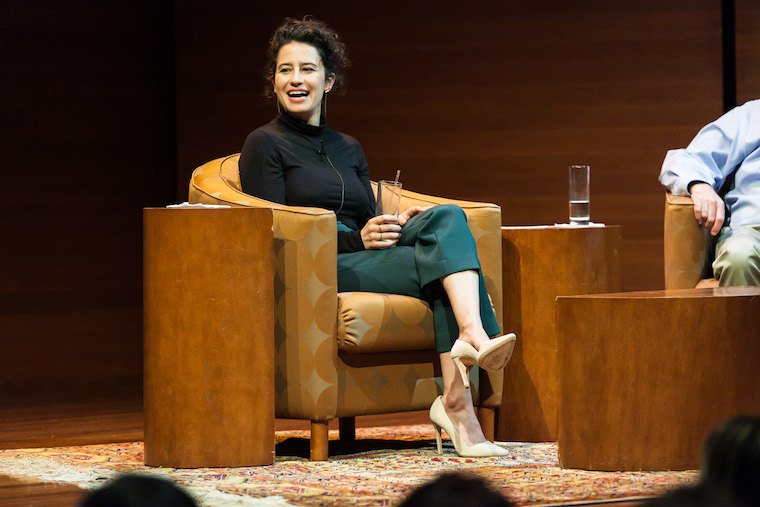3 Things We Learned About Intuition From Broad City’s Ilana Glazer
On Broad City, Ilana is a whirlwind of id, running the streets of New York City fueled by an intense mix of can-do swagger, dreamy enthusiasm, and mama bear protectiveness toward BFF Abbi. But how does the real Ilana—AKA show co-creator Ilana Glazer—run her life? Yep, intuition is a big part of it.
"I do think your destiny is written inside you. And engaging with people, engaging with exercises that develop that intuition helps you get there," says Glazer, who spoke with David Ludden, PhD, a professor of psychology at Georgia Gwinnett College near Atlanta, about intuition at a Rubin Museum of Art event in New York City this week.

"Daring to hear your instinct of where you should be—I feel like everybody can access their personal destiny if they're attuned to it," she says.
Intriguing, especially coming from someone who is seriously crushing it professionally right now. (If you don't know the backstory, Glazer and co-creator/co-star Abbi Jacobson started Broad City as a DIY web series and turned it into a hit show on Comedy Central, produced by Amy Poehler. In other words, they are living their dream and hanging out with Leslie Knope on the reg—#goals.)
So what else can you learn about intuition from Glazer, who taps into her instincts as a creative genius-on-the-rise, and Ludden, who is a scientific expert on the topic? Plenty.

{{post.sponsorText}}
Read on for three things you might not know about intuition, as it relates to decision-making, mindfulness, and hyper-productive states of mind.
1. You already have intuition; you just have to pay attention to it
As a writer, actress, and improv comedian, working on an intuitive level is what Glazer does every day. But you don't have to make a living coming up with GIF-worthy moments to get in touch with that skill. In fact, Dr. Ludden says it's the most basic form of thought.
"We're all intuitive. That's the basic machinery we have. It takes effort to become analytical," Dr. Ludden explains, adding that intuition takes extremely subtle physical clues and processes them on a subconscious level. So, for instance when you meet someone and feel a recognition—no surprise, Glazer says she felt that jolt when she met Jacobson—it's often because your intuitive brain is perceiving an incredible number of details that make you feel comfortable with that person, without you consciously realizing it.
So why are some of us so disconnected from it, if it's such a basic built-in brain function? "As we grow up we're told not to trust our intuition, and we're really taught to value the analytical mind. But the reality is we need a balance of both," Dr. Ludden says. "The mindfulness craze within psychology right now is really about getting back in touch with intuition."
2. Getting into "flow state" is all about rhythm
"Flow state" (an idea popularized by the 2008 book Flow) is when you're doing something you're good at, which you also enjoy, and you lose track of time and maybe even disconnect from who you are, Dr. Ludden says. The result? Usually, your performance goes up several notches.
Think: those days when crow pose is a breeze (even though you've fallen on your face for the previous 30 days). Or when you've got a packed calendar and an overflowing inbox—and suddenly it's 6 p.m. and everything, somehow, got done.
For Glazer, getting in that state where her comedy mojo is flowing is a physical sensation. "I'm a drummer, and in performance I think about rhythm all the time," Glazer says. "When things feel really effortless, it feels like a body sense and intuition at the same time."
She's also in favor of unplugging: "There's something about all this content coming at you all the time.... My instinct is to go back to those old Nokia phones," she says, adding that, yes, she could just turn her smartphone off. "I could. But so many texts." (Feel ya.)
3. And what about those times when you think of a friend, and right then she calls?
Dr. Ludden says it's all about confirmation bias: "You're not remembering all those times when you thought about her and she didn't call. Or when you didn't think about her and she called anyway."
But Glazer believes we can still find meaning in the random. "This has been happening to me more and more as I get older, and it feels so mystical. I really do think people are magic, and we tend to dampen that with the way we live," she says, while admitting to feeling foolish talking about "magic" with a scientist. "But there really is something magical about exercising that sense that's always there."
Another person who's firmly pro-magic? Elizabeth Gilbert, who says being creative gets you to a happier, more fulfilled place—whether you think you're good at it or not. And then of course there's Marie Kondo, who at this point may be able to transform everything from your home to your diet to your mind.
Loading More Posts...